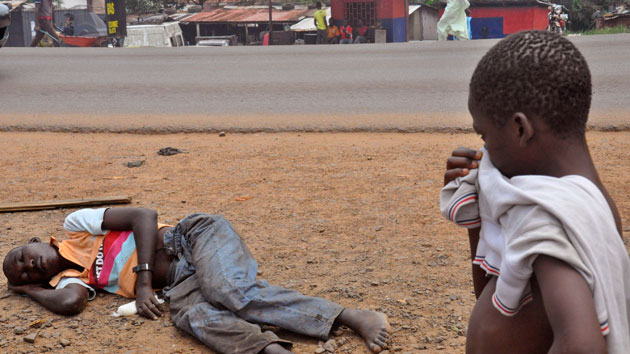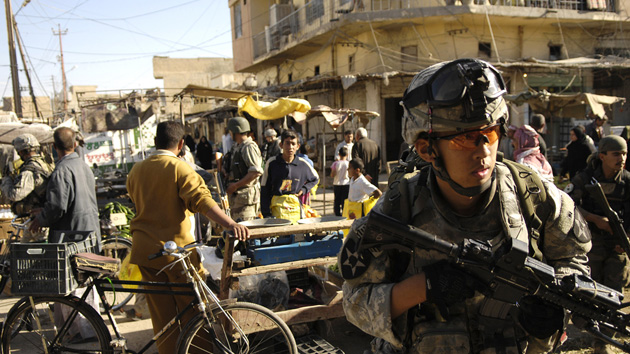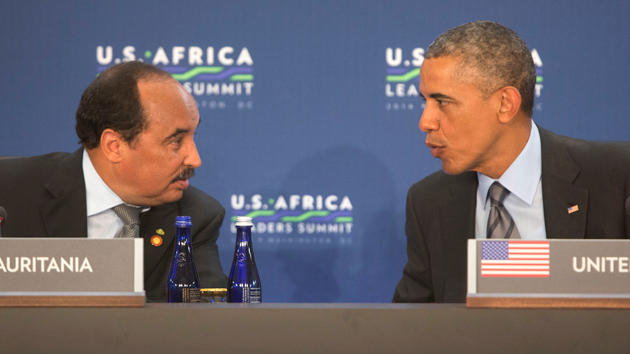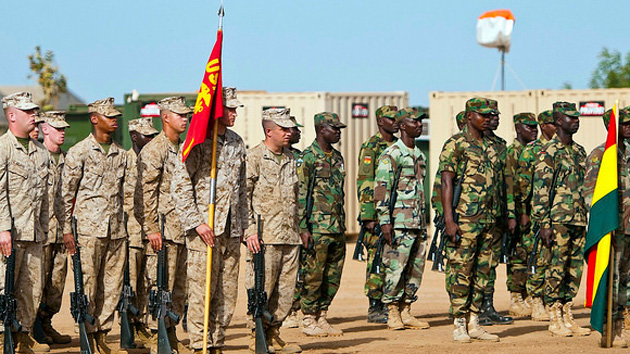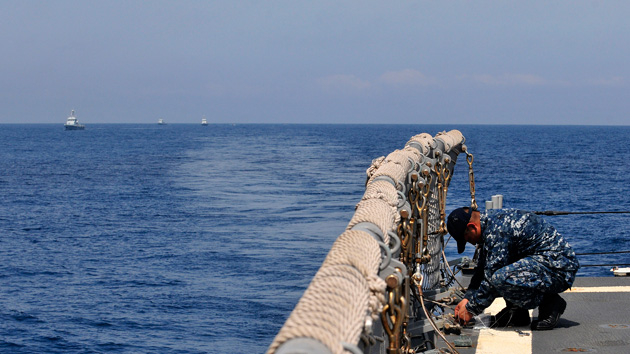
A US sailor during joint naval exercises with the Ghanaian Navy, February 2012.<a href="https://www.flickr.com/photos/rustique/9475017516/in/photolist-frgWAY-frgUGC-frgVob-fr2V1z-fr2pMP-frgEUQ-fr2RqH-frhbmu-frhaSW-fr2UgX-fr2Dnz-frgUhm-fr2B9p-7pWVku-frgNkW-fr2u7a-frgNLm-frgLo1-frgQ1L-fr2sLv-frgKTN-fr2xJV-frgFUh-fr2jcD-fr2rpM-frgHpQ-fr2p2M-fr2kHV-5VCP31-cgED2j-kkmqGe-pbj4ba-frgBgL-frgChd-frgDHQ-fr2mst-7Kt5MU-5VCP1j-8qVxBG-84tefW-dYjKTA-cXewkd-5k8nYp-bnyTQi-5kcEbW-79qWeE-nhh7RJ-ngXsdq-ngXtbM-nwgcLq">Felicito Rustique</a>/Flickr
This story first appeared on the TomDispatch website and was reported in partnership with the Investigative Fund at the Nation Institute. Additional funding was provided through the generosity of Adelaide Gomer.
“The Gulf of Guinea is the most insecure waterway, globally,” says Loic Moudouma. And he should know. Trained at the US Naval War College, the lead maritime security expert of the Economic Community of Central African States, and a Gabonese Navy commander, his focus has been piracy and maritime crime in the region for the better part of a decade.
Moudouma is hardly alone in his assessment.
From 2012 to 2013, the US Office of Naval Intelligence found a 25% jump in incidents, including vessels being fired upon, boarded, and hijacked, in the Gulf of Guinea, a vast maritime zone that curves along the west coast of Africa from Gabon to Liberia. Kidnappings are up, too. Earlier this year, Stephen Starr, writing for the CTC Sentinel, the official publication of the Combating Terrorism Center at West Point, asserted that, in 2014, the number of attacks would rise again.
Today, what most Americans know about piracy likely centers on an attraction at Walt Disney World and the Johnny Depp movies it inspired. If the Gulf of Guinea rings any bells at all, it’s probably because of the Ebola outbreak in, and upcoming US military “surge” into, Liberia, the nation on the northern edge of that body of water. But for those in the know, the Gulf itself is an intractable hotspot on a vast continent filled with them and yet another area where US military efforts have fallen short.
A recent investigation by the US Government Accountability Office (GAO) found that “piracy and maritime crime in the Gulf of Guinea has escalated” and that “armed robbery at sea, oil theft, and kidnapping is a persistent problem that continues to contribute to instability” there. Not only that, but as Pottengal Mukundan, the director of the International Maritime Bureau of the International Chamber of Commerce, recently noted, piracy in the Gulf has taken on a particularly violent character.
What Benjamin Benson, media chief for US Africa Command (AFRICOM), thinks isn’t quite so clear. As the situation in the Gulf of Guinea was worsening, he touted it as an American “success” story, pure and simple. Then he claimed that he hadn’t done so, after which he clammed up completely. What he thinks today is anyone’s guess. He now refuses to say a word about it.
Loic Moudouma, for his part, claims to see progress in bringing security to a body of water nearly the size of the Gulf of Mexico that is critical to the economies of a dozen nations. He also credits the United States for its support of security efforts there, even if they have paradoxically occurred alongside an increase in both piracy and insecurity. West African states, says Moudouma, have left waterways ungoverned, turning them into breeding grounds for criminal activity. The problem, he insists, is the poor leadership of the African nations in the region, America’s “partners” on the frontlines of the fight. Their lust for power, according to Moudouma, has put the national security of numerous African nations and the economic well-being of the region at risk, yet the Obama administration only recently feted the area’s most corrupt strongman and the US military regularly partners with his armed forces.
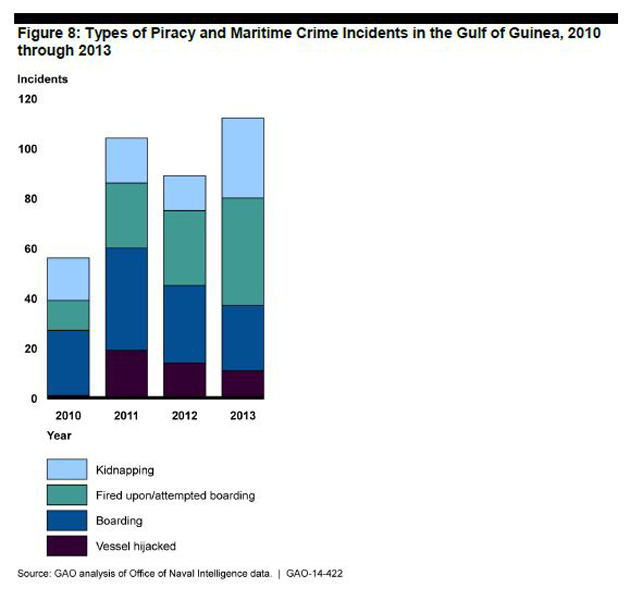
The Sweet Smell of Success
“Do not put words in my mouth. I did not say the Gulf of Guinea was a success. I did not say Gulf of Guinea maritime security was a success.” This was AFRICOM spokesman Benson’s response last November when I asked if he wanted to amend his earlier assessment of the Gulf of Guinea shortly after pirates kidnapped two Americans from a US-flagged ship there.
I was taken aback.
I remembered him touting the region as a triumph when we talked in the spring of 2013, so I went back to a recording of our conversation. “I’m wondering what you think the big success stories are,” I had asked about AFRICOM’s work on the continent. “There’s actually two success stories,” he replied, telling me first about American efforts in Somalia. “Another area that’s definitely a success is the Gulf of Guinea,” he added. “We’ve been working with a number of different states developing… maritime security capabilities.”
I listened to that passage several times. It sure sounded like he was calling the Gulf of Guinea a success.
For almost a year since then, Benson has failed to amend, clarify, or defend his statement. He has ignored repeated requests for further information, refusing even to issue a pro forma “no comment.” He may still claim that he never uttered those words or he may still believe the Gulf has been an American success story, but even his boss, AFRICOM commander General David Rodriguez, in testimony before the House Armed Services Committee earlier this year, said “maritime criminal activities in the Gulf of Guinea remain at concerning levels.”
America’s Battle Against Pirates
The United States has been fighting African pirates since the early days of the republic—battles so formative that, among other things, they established a long-standing pattern of dealing with foreign policy problems through armed interventions and also inspired the iconic phrase “the shores of Tripoli” in the Marine Corps hymn. By the late 2000s, American ships were once again under attack off an African coastline and the US military had again been dispatched to kill pirates. This time around, the conflict centered on the Horn of Africa—not North Africa—specifically the waters off the coast of Somalia.
In the 1990s, Somalia descended into a maelstrom of violence, which has abated somewhat in recent years but continues to plague that nation and has since spread beyond its borders. In 1993, when American troops infamously arrived in its capital, Mogadishu, in support of a United Nations humanitarian mission, they suffered 18 killed and two helicopters shot out of the sky in the “Black Hawk Down” disaster. Somalia was then repeatedly battered as Islamic militants struggled for control against US-backed militias and various African armed forces. During those years, neighboring nations began illegally fishing in Somali waters, prompting local fishermen to arm themselves and collect “taxes” from foreign vessels. Some of these proto-pirates soon began hijacking relief food shipments, while others moved on to attacking merchant vessels and oil tankers. By 2008, Somali swashbucklers were, by some estimates, raking in as much as $150 million annually.
That same year, the US National Security Council (NSC) developed a document it called “Countering Piracy off the Horn of Africa: Partnership and Action Plan.” Its focus was the prevention and disruption of maritime crime off the coast of Somalia. Despite this, the number of reported attacks in the region nearly doubled between 2008 and 2009, and the next year the GAO weighed in with recommendations for the NSC to “reassess and update its Action Plan; identify metrics; assess the costs, benefits, and effectiveness of US counter-piracy activities; and clarify agency roles and responsibilities.” For the next four years, however, the NSC failed to respond.
 In those years, the United Nations also passed numerous resolutions related to maritime crime in the Horn of Africa, authorizing international militaries to conduct counter-piracy efforts. Naval patrols and other missions by NATO and the European Union as well as Australia, Bahrain, Canada, France, Jordan, South Korea, the Netherlands, Pakistan, Saudi Arabia, Singapore, Spain, Thailand, Turkey, China, Russia, Japan, India, and the US—in addition to the use of armed mercenaries to protect ships and a slew of new policies designed to thwart attacks—have had a demonstrable effect. According to the International Maritime Bureau, piracy incidents in the Horn of Africa declined from 219 in 2010 to just 15 in 2013.
In those years, the United Nations also passed numerous resolutions related to maritime crime in the Horn of Africa, authorizing international militaries to conduct counter-piracy efforts. Naval patrols and other missions by NATO and the European Union as well as Australia, Bahrain, Canada, France, Jordan, South Korea, the Netherlands, Pakistan, Saudi Arabia, Singapore, Spain, Thailand, Turkey, China, Russia, Japan, India, and the US—in addition to the use of armed mercenaries to protect ships and a slew of new policies designed to thwart attacks—have had a demonstrable effect. According to the International Maritime Bureau, piracy incidents in the Horn of Africa declined from 219 in 2010 to just 15 in 2013.
“At the peak point of operations, up to 30 vessels from as many as 22 nations were engaged in counter-piracy operations in the region,” Rear Admiral Joseph Kuzmick told Congress last year. “International naval forces have thwarted pirate attacks in progress, engaged pirate skiffs, and successfully taken back hijacked ships during opposed boardings.” While a truly international effort, the battle against the Somali pirates ranks as one of the few true bright spots for the US military in Africa.
Over these same years, the US has also been pouring money and effort into maritime security activities on the other side of the continent with drastically different results.
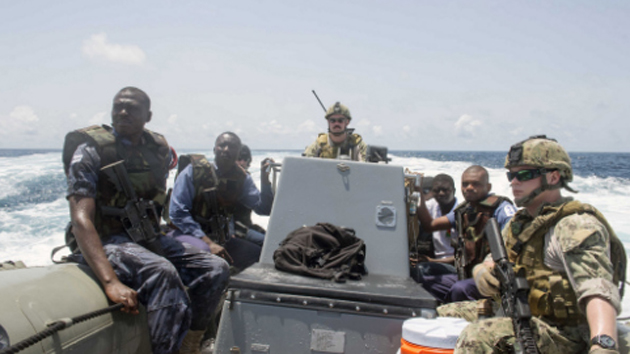
From 2007 to 2011, the US provided $35 million to West and Central African countries for coastal radar, boats, equipment, and maritime security training. These efforts included the African Partnership Station (APS)—a shipboard effort designed to “provide quality military training to sailors and leaders of [partner] nations.” Under the auspices of the APS, the United States annually hosts four regional security exercises around the African continent: Cutlass Express, Phoenix Express, Saharan Express, and Obangame Express, the latter based in the waters off West Africa.
By 2012, five years after it was launched, APS activities involved more than 30 African, European, and North and South American countries. In last year’s iteration of Obangame Express, some 16 nations participated in exercises in the Gulf of Guinea, including Benin, Cameroon, Côte d’Ivoire, Equatorial Guinea, France, Gabon, Nigeria, Republic of Congo, São Tomé and Príncipe, Togo, and the United States. This year, 20 nations were involved, including 11 which took part in boarding exercises conducted aboard 36 different vessels in the gulf.
AFRICOM and the US Coast Guard also provide counter-piracy training as well as instruction in search and seizure skills through the African Maritime Law Enforcement Partnership program. In addition, the US has held seminars, symposiums, and conferences devoted to maritime security; it has donated spare parts and even entire ships to West African allies, provided hands-on maintenance instruction, advised personnel from regional navies and coast guards, and offered aid for maritime counter-narcotics and law-enforcement projects.
Despite all these efforts, maritime insecurity has been markedly on the rise in the waters off West Africa. When I spoke last year with AFRICOM’s Benson about signs of US “success” in the Gulf of Guinea, he cited US efforts that culminated in a conference where West and Central African leaders would hammer out a comprehensive strategy to improve maritime security, with a formal code of conduct for states to follow. At the time, however, the conference—organized by the Economic Community of Central African States, the Economic Community of West African States, and the Commission of the Gulf of Guinea—had yet to take place.
How could that count as a success, I wondered, especially when signs of regional failure were all too evident? According to the US Office of Naval Intelligence, incidents of piracy and maritime crime in the Gulf of Guinea jumped more than 80% from 2010 to 2013. Last year, according to Oceans Beyond Piracy, an advocacy group focusing on maritime security issues, West African pirates attacked at least 1,871 “seafarers” and 279 were known to have been taken hostage. Additionally, 1,209 vessels were boarded by pirates. Experts now estimate that $2 billion is lost each year in port revenue, insurance premiums, and security costs due to maritime crime in the Gulf of Guinea.
Getting Cozy With Africa’s Most Corrupt Strongman
It was at a conference hosted by the Department of Defense’s Africa Center for Strategic Studies, held on the periphery of the White House’s US-Africa Leaders Summit in August, that Loic Moudouma spoke positively about US assistance in the region while also asserting that the Gulf of Guinea was the most insecure and violent waterway in the entire world. When I questioned him about this apparent paradox—asking why maritime insecurity has escalated during years of increased US assistance—he pointed to the slow pace in implementing plans and the relentlessness of the region’s pirates. He also put the blame squarely on America’s allies in Africa. “The state is still absent from the sea,” he said, drawing attention to the inability of nations to police their territorial waters. Moudouma also called out the region’s heads of state. “Over the last decade, our political leaders have been investing in how to stay in power as long as possible,” he said.
Moudouma sees systemic problems at the ministerial and presidential levels in African governments and called for more action aimed at heads of state. This type of pressure, however, didn’t seem to be on the table at that recent White House summit when President Obama hosted—and stood for a smiling portrait with—Equatorial Guinea’s President Teodoro Obiang.
Since he first seized power in a coup 35 years ago (just before Obama began his freshman year in college), Obiang has ruled that tiny, oil-rich nation on the Gulf of Guinea with an iron fist. A perennial pariah state, his country is noted for its utter lack of press freedom and political opposition, and a profusion of corruption, oppression, and human rights abuses, including extrajudicial killings and the imprisonment and torture of opposition figures. While most of Equatorial Guinea lives on about $2 per day, the Obiang family lives the high life, complete with a fleet of flashy cars—including Ferraris, Rolls-Royces, and Lamborghinis—not to mention private jets.
The country seems to be the archetypal example of the sort of corruption Moudouma denounced. It ranked 163 out of 175 on Transparency International’s Corruption Perceptions Index in 2013. Yet year after year, US forces have partnered with those of Equatorial Guinea for military exercises, training missions, and even, according to a 2009 Navy press release, “a flight deck reception for distinguished Equatorial Guinean visitors in order to develop relationships and promote regional cooperation between Equatorial Guinea and the United States.”
Succeeding at Failure
On June 19th, the Government Accountability Office published a new report, “Ongoing US Counter-Piracy Efforts Would Benefit From Agency Assessments.” It contrasted the much-improved situation off Somalia’s coast with the “persistent problem” of piracy and maritime crime in the Gulf of Guinea. It also drew attention to recommendations—like systematically tracking costs and identifying which agencies will lead or support various counter-piracy efforts—that, after four years, had yet to be implemented.
A day later, the National Security Council unveiled its 2014 “United States Counter Piracy and Maritime Security Action Plan.” According to a statement provided to TomDispatch by NSC spokesman Ned Price, it “provides guidance to the Federal government focusing on three core areas including: prevention of attacks, response to acts of maritime crime, and enhancing maritime security and governance.”
The new plan contains an annex devoted to the Gulf of Guinea (which went unmentioned in the 2008 report) and, according to the NSC, “effectively addresses the recommendations raised in the [June 2014 GAO] report.” That isn’t quite the case according to Stephen Caldwell, one of that report’s authors. “Our recommendations from the earlier report were only partially fulfilled,” he told me. “Some of the more specific issues were not addressed.”
While acknowledging that the National Security Council has a lot on its plate beyond piracy, Caldwell drew attention to the ways in which a continuing failure to track costs, identify resource constraints, and define specific roles for the agencies involved in maritime security efforts can lead to a lack of accountability and the inability to fix ineffective efforts. “Although the United States has interagency and international efforts underway with African states to strengthen maritime security, it has not assessed its efforts or the need for a collective plan to address the evolving problem in the region,” says the GAO report. “The US role in addressing piracy in the Gulf of Guinea has focused on prevention, disruption, and prosecution, through training and assistance to African coastal states. However, according to US agencies working in the region, the National Security Council Staff (NSCS) has not directed them to collectively assess their efforts to address piracy and maritime crime.”
US failures when it comes to the Gulf of Guinea are many: a failure to address the longstanding concerns of a government watchdog agency, a failure to effectively combat piracy despite an outlay of tens of millions of taxpayer dollars, and a failure to confront corrupt African leaders who enable piracy in the first place. In fact, the rolling out of a red carpet in Washington for an astoundingly corrupt West African strongman, precisely the type of leader even a Pentagon-approved analyst cites as the source of regional instability, mirrors other US efforts in Africa, from Libya to Mali to South Sudan, which have crumbled, collapsed, crashed, and burned.
For the better part of a year, following his email outburst about putting words in his mouth, US Africa Command spokesman Benjamin Benson has ignored my repeated requests for comment or clarification when it comes to the Gulf of Guinea. And it’s little wonder. After all, as the US military has shown repeatedly in its “pivot” to Africa over these last years, it’s so much easier to claim success than to achieve it.
Nick Turse is the managing editor of TomDispatch.com and a fellow at the Nation Institute. A 2014 Izzy Award winner, he has reported from the Middle East, Southeast Asia, and Africa and his pieces have appeared in the New York Times, the Los Angeles Times, the Nation, and regularly at TomDispatch. This story was reported in partnership with the Investigative Fund at the Nation Institute. Additional funding was provided through the generosity of Adelaide Gomer. To stay on top of important articles like these, sign up to receive the latest updates from TomDispatch.com here.
